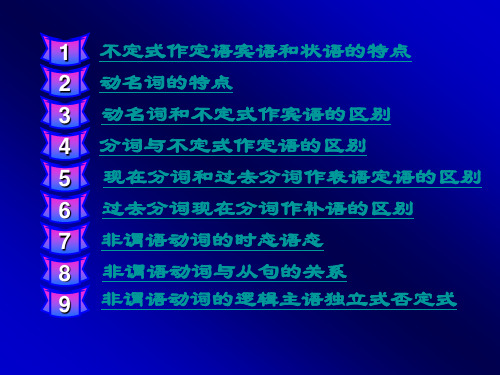高中非谓语动词精讲课件
合集下载
非谓语动词超详细讲解ppt课件

动名词的形式
动名词既有普通形式,也有完成形式和被动形式。完成形式表示动作已经完成, 如having read;被动形式表示动作被承受,如being written。
动名词在句子中的成分
动名词也可以作表语,用来描述 主语的内容或性质,如Her job is teaching English.
动名词还可以作定语,修饰名词, 如a reading room, a swimming pool等。
非谓语动词超详用法与功能 • 动名词的用法与功能 • 分词的用法与功能 • 独立主格结构的用法与功能 • 非谓语动词的注意事项与误区
01
非谓语动词概述
Chapter
定义与作用
定义
非谓语动词是指在句子中不充当谓 语的动词,包括不定式、动名词和 分词三种形式。
独立主格结构的时态和语态
时态
独立主格结构的时态主要根据句子中的谓语动词来确定。如果谓语动词是现在时或将来 时,独立主格结构用现在分词;如果谓语动词是过去时,独立主格结构用过去分词。
语态
独立主格结构的语态分为主动语态和被动语态。当独立主格结构的逻辑主语与非谓语动 词之间是主动关系时,用主动语态;当逻辑主语与非谓语动词之间是被动关系时,用被 动语态。例如:“The problem being settled, we all felt relieved.”(问题解决了,
我们都感到松了一口气。)
06
非谓语动词的注意事项与误区
Chapter
非谓语动词使用时需要注意的问题
动词不定式、动名词和分词的区别
01
在使用非谓语动词时,需要根据语境和表达的逻辑关系选择适
当的非谓语动词形式。
时态和语态的正确使用
02
动名词既有普通形式,也有完成形式和被动形式。完成形式表示动作已经完成, 如having read;被动形式表示动作被承受,如being written。
动名词在句子中的成分
动名词也可以作表语,用来描述 主语的内容或性质,如Her job is teaching English.
动名词还可以作定语,修饰名词, 如a reading room, a swimming pool等。
非谓语动词超详用法与功能 • 动名词的用法与功能 • 分词的用法与功能 • 独立主格结构的用法与功能 • 非谓语动词的注意事项与误区
01
非谓语动词概述
Chapter
定义与作用
定义
非谓语动词是指在句子中不充当谓 语的动词,包括不定式、动名词和 分词三种形式。
独立主格结构的时态和语态
时态
独立主格结构的时态主要根据句子中的谓语动词来确定。如果谓语动词是现在时或将来 时,独立主格结构用现在分词;如果谓语动词是过去时,独立主格结构用过去分词。
语态
独立主格结构的语态分为主动语态和被动语态。当独立主格结构的逻辑主语与非谓语动 词之间是主动关系时,用主动语态;当逻辑主语与非谓语动词之间是被动关系时,用被 动语态。例如:“The problem being settled, we all felt relieved.”(问题解决了,
我们都感到松了一口气。)
06
非谓语动词的注意事项与误区
Chapter
非谓语动词使用时需要注意的问题
动词不定式、动名词和分词的区别
01
在使用非谓语动词时,需要根据语境和表达的逻辑关系选择适
当的非谓语动词形式。
时态和语态的正确使用
02
高中英语非谓语动词课件(70张)

She came here to study English.
主语
宾语 表语
定语 状语
I warned the patient not to eat cold water
after the operation.
宾补
(1)作主语 不定式做主语时, 可以直接放在谓语动词之前。
To see is to believe.
Subject+ find/think/feel/make/ consider… it +adj/n + to do sth.
1.We thought ___ better ___ start early. 2.Do you consider ___ better not __ go? 3. I feel __ my duty __ change all that. 4.We think __ important __ obey the law. 5.I know __ impossible __ finish so much homework in a day.
句型3: It is adj. for/of sb. to do sth.
It is + adj + for sb to do sth (是形容事物的性质的 ) It is + adj + of sb to do sth (是形容人的品质的 )
It is easy for me to finish this work before ten. It is a great honor for us to be present at your birthday party.
make let have
do + sb. + doing
主语
宾语 表语
定语 状语
I warned the patient not to eat cold water
after the operation.
宾补
(1)作主语 不定式做主语时, 可以直接放在谓语动词之前。
To see is to believe.
Subject+ find/think/feel/make/ consider… it +adj/n + to do sth.
1.We thought ___ better ___ start early. 2.Do you consider ___ better not __ go? 3. I feel __ my duty __ change all that. 4.We think __ important __ obey the law. 5.I know __ impossible __ finish so much homework in a day.
句型3: It is adj. for/of sb. to do sth.
It is + adj + for sb to do sth (是形容事物的性质的 ) It is + adj + of sb to do sth (是形容人的品质的 )
It is easy for me to finish this work before ten. It is a great honor for us to be present at your birthday party.
make let have
do + sb. + doing
高中英语——非谓语动词课件(共34张PPT)

定 式 与
It is not likely that she has got our letter.
从
= She is not likely to have got our letter.
句
advise allow permit forbid
sb. to do sth.
advise allow permit forbid
1 不定式作定语宾语和状语的特点 2 动名词的特点 3 动名词和不定式作宾语的区别 4 分词与不定式作定语的区别 5 现在分词和过去分词作表语定语的区别 6 过去分词现在分词作补语的区别 7 非谓语动词的时态语态 8 非谓语动词与从句的关系 9 非谓语动词的逻辑主语独立式否定式
非
特共 点点
句中的作用
2. There is something t(ofodrosomebody) to do. There is a letter to write. There is no time to lose. There is something to pay attention to. Will you attend the lecture to be given next week?
(状语)
不定式与所修饰名词有逻辑上的动宾关系
1. n. / pron. + Mary has 逻辑主
to Vt. to Vi + prop. three babies to look after. 逻辑宾
Please buy me some newspapers to read. 逻辑主 逻辑宾
He always has a lot of meetings to attend. Please pass me some paper to write on.
非谓语动词讲解ppt

ing 形式 主动 被动
过去分词 被动
一般式 to do
完成式 to have done
进行式 to be doing
to be done
to have be done
being done
having been done
done
分词 不定式作宾补用法要点 一 分词 不定式作宾语补足语的区别 1 感官动词see; watch; observe; look at; hear; listen to; notice 等和使役动词have 后面的宾补有三种形式;即原形动词不带to 的 不定式 现在分词和过去分词 现在分词表主动 或正在进行;过去分词表被动或完成;动词原形 表主动和完成 如: I heard her sing an English song just now I heard her singing an English song when I passed by her room yesterday
• ③ have sb do sth get sb to do sth 使/让 /叫某人去做某事
• 如:Mother had me go to the shop and buy some salt
• I can’t get him to stop smoking He won’t listen to me
• ③ The flu is believed to be caused by viruses that like to reproduce in the cells inside the human nose and throat
• 三 不定式 现在分词作宾补小窍门 • 下列动词后在主动语态中用不带to 的不定式作补
过去分词 被动
一般式 to do
完成式 to have done
进行式 to be doing
to be done
to have be done
being done
having been done
done
分词 不定式作宾补用法要点 一 分词 不定式作宾语补足语的区别 1 感官动词see; watch; observe; look at; hear; listen to; notice 等和使役动词have 后面的宾补有三种形式;即原形动词不带to 的 不定式 现在分词和过去分词 现在分词表主动 或正在进行;过去分词表被动或完成;动词原形 表主动和完成 如: I heard her sing an English song just now I heard her singing an English song when I passed by her room yesterday
• ③ have sb do sth get sb to do sth 使/让 /叫某人去做某事
• 如:Mother had me go to the shop and buy some salt
• I can’t get him to stop smoking He won’t listen to me
• ③ The flu is believed to be caused by viruses that like to reproduce in the cells inside the human nose and throat
• 三 不定式 现在分词作宾补小窍门 • 下列动词后在主动语态中用不带to 的不定式作补
《非谓语动词》课件(共12张PPT)

定语从句中的非谓语动词
在定语从句中,非谓语动词可以用来修饰名词或代词,表示名词或代词 的状态或特征。
非谓语动词在定语从句中的使用可以使句子更加生动形象,增强语言的 表达力。
需要注意的是,非谓语动词在定语从句中的使用需要遵循一定的语法规 则和习惯,不能随意使用。同时,与定语从句中的其他成分一起构成完 整的意义。
独立主格结构
独立主格结构是一种特殊的句式,其 中非谓语动词与主句的主语没有明确 的逻辑关系,而是通过独立的主语来 表达完整的意义。
常见的独立主格结构包括名词/代词+ 非谓语动词、名词/代词+形容词、名 词/代词+副词等。
独立主格结构通常用于描述一个独立 的事件或状态,与主句之间用逗号或 分号隔开,有时也可以省略独立主格 结构中的主语和谓语。
不定式是由“to + 动词原形” 构成的,在句子中不充当谓语
,而是作为其他成分使用。
不定式的时态和语态
不定式可以有多种时态和语态 ,包括一般式、进行式、完成 式和被动式。
不定式的功能
不定式可以作为主语、宾语、 定语、状语和补语等,在句子 中发挥不同的作用。
不定式的否定形式
不定式的否定形式是在“to”前 面加上“not”,例如“not to
详细描述
非谓语动词在句子中起到丰富句子结构和表达多样性的作用 。它们可以代替从句,使句子更加简洁明了。同时,非谓语 动词还可以表达动作的主动和被动关系,以及动作的完成和 进行状态等。
02 非谓语动词的时态和语态
主动语态
主动语态表示主语是 动作的执行者。
主动语态常用于描述 主语执行的动作,强 调主语的主动性和积 极性。
THANKS FOR WATCHING
高考英语专题《非谓语动词讲解》 (全面详细)精品课件

2. Our work is serving the people. 表语
3. I remember being taken to Wuhan when I was a very small child. 宾语
4. We have a swimming poor in the back
yard.
定语
11
动名词与不定式作主语,表语的区别 动名词作主语时往往表示一般性的、习惯性的动 作;而不定式作主语则表示在具体情况下特定的 或一次性的动作。但有时可以通用。
12
只能用动名词作宾语的动词
1.advise, allow, avoid, admit, consider, delay, enjoy, escape, excuse, finish, imagine, mind, miss, permit, practise, risk, suggest, appreciate
主动(vt.) 被动(vt.) 主动(vi.) 被动(vi.)
一般式 to do to be done to do
/
进行式 to be
/
to be
/
doing
doing
完成式 to have to have to have
/
done been do式是指带 to 的动词原形( 使用中有时不带 to ) (一) 作主语 To see is to believe. To see you is glad.=It is glad to see you. (二)作宾语 I want to see you. (三)作表语 My hope is to see you.
9
动名词(主、宾、定、表)
主动 被 动 主动 被 动
高中非谓语动词课件

She came here to study English
主语
宾语 表语
定语 状语
I warned the patient not to eat cold water
after the operation
宾补
1作主语 不定式做主语时;可以直接放在谓语动词之前
To see is to believe
+ to do
made let
4 it作形式宾语
I find/feel to work with him interesting
I find/feel it interesting to work with him 注意:不定式短语作宾语时;如果还带有宾语补足语;往往把 不定式宾语放在宾语补足语之后;而用it作形式宾语
• B 常跟疑问词+不定式作宾语的动词: • tell; advise; show; teach; find out;
decide; discuss; learn; explain… know; show; discover; seeunderstand • He taught us how to use the tool • No one could tell me where to get the book • I hope you’ll advise me what to do I don't know how to get there
④
mean stop
+
to do doing
go on
1 Boys; don't forget _____ the windows before you leave the classroom A closing B closed C to closing D to close
主语
宾语 表语
定语 状语
I warned the patient not to eat cold water
after the operation
宾补
1作主语 不定式做主语时;可以直接放在谓语动词之前
To see is to believe
+ to do
made let
4 it作形式宾语
I find/feel to work with him interesting
I find/feel it interesting to work with him 注意:不定式短语作宾语时;如果还带有宾语补足语;往往把 不定式宾语放在宾语补足语之后;而用it作形式宾语
• B 常跟疑问词+不定式作宾语的动词: • tell; advise; show; teach; find out;
decide; discuss; learn; explain… know; show; discover; seeunderstand • He taught us how to use the tool • No one could tell me where to get the book • I hope you’ll advise me what to do I don't know how to get there
④
mean stop
+
to do doing
go on
1 Boys; don't forget _____ the windows before you leave the classroom A closing B closed C to closing D to close
高中牛津英语非谓语动词语法公开课课件.ppt

❖ 1. ______ blood if you can and many lives will be saved.
❖ A. Giving B. Give C. Given D. To give ❖ 2.______ some of this juice, you’ll like it. ❖ A. Trying B. Try C. To try D. Tried ❖ 3. When he returned , he found the book
一、分析句子结构,辨别“谓与非谓” 1. _C_____many time_s_, _b_u_t_he still couldn't understand it . 2. _A_____many times , he still couldn't understand it . A. Having been told B. Told
• having been built
• to be built
C.being built
D. built
After he graduated from Harvard, Obama worked as a lawyer, lecturer and then took up politics.
Having graduated from
❖ 1.非谓语作状语时, ❖ 2.非谓语作定语时, ❖ 3.非谓语作宾补时, ❖ 4.非谓语作表语时, ❖ 5.独立主格结构中,
三、分析语态
分析语态就是在确定逻辑主语之后, 分析非谓语动词和逻辑主语在搭配 使用时是主动还是被动关系。
1._S__e_e_n___from the top of the hill, o__u_r_
True or false 1k.iNBnodetilnye.g:Fatnheorapghraene,mtehnetnoufrstehetresautbejdectth.e boy
❖ A. Giving B. Give C. Given D. To give ❖ 2.______ some of this juice, you’ll like it. ❖ A. Trying B. Try C. To try D. Tried ❖ 3. When he returned , he found the book
一、分析句子结构,辨别“谓与非谓” 1. _C_____many time_s_, _b_u_t_he still couldn't understand it . 2. _A_____many times , he still couldn't understand it . A. Having been told B. Told
• having been built
• to be built
C.being built
D. built
After he graduated from Harvard, Obama worked as a lawyer, lecturer and then took up politics.
Having graduated from
❖ 1.非谓语作状语时, ❖ 2.非谓语作定语时, ❖ 3.非谓语作宾补时, ❖ 4.非谓语作表语时, ❖ 5.独立主格结构中,
三、分析语态
分析语态就是在确定逻辑主语之后, 分析非谓语动词和逻辑主语在搭配 使用时是主动还是被动关系。
1._S__e_e_n___from the top of the hill, o__u_r_
True or false 1k.iNBnodetilnye.g:Fatnheorapghraene,mtehnetnoufrstehetresautbejdectth.e boy
高二语法精讲非谓语动词课件(共32张)

Attracted by the beauty of nature, the girl from London decided to spend another two days on the farm.
3) 宾语补足语 Every time they come to China, they find it greatly changed. The boy had his leg broken during the match. 4) 定语
A.find
B. found
C. to find
D. finding
3) The letter we had been looking forward to arrived _______ (arrive) at last. 4) The day you look forward ______________ soon. A. is coming B. to is coming C. to come D. comes
The aim of the class is to get the general Idea of the passage.
To . see is to believe.
What I want to suggest is to start the work at once.
3) 动词宾语 The manager wanted to open a new market in Europe. Please inform me where to get the ticket. 4) 宾语补足语 You made me laugh.
作定语时,三者的区别
The question discussed yesterday is important. 被动、完成 The question being discussed now is important. 被动,正在进行 The question to be discussed tomorrow will be important. 被动,将来 注意以上三句话中红体字所表示的时间上的 差别。
3) 宾语补足语 Every time they come to China, they find it greatly changed. The boy had his leg broken during the match. 4) 定语
A.find
B. found
C. to find
D. finding
3) The letter we had been looking forward to arrived _______ (arrive) at last. 4) The day you look forward ______________ soon. A. is coming B. to is coming C. to come D. comes
The aim of the class is to get the general Idea of the passage.
To . see is to believe.
What I want to suggest is to start the work at once.
3) 动词宾语 The manager wanted to open a new market in Europe. Please inform me where to get the ticket. 4) 宾语补足语 You made me laugh.
作定语时,三者的区别
The question discussed yesterday is important. 被动、完成 The question being discussed now is important. 被动,正在进行 The question to be discussed tomorrow will be important. 被动,将来 注意以上三句话中红体字所表示的时间上的 差别。
非谓语动词讲解课件-PPT(精)

C
2). Little Jim should love __________ to the A theatre this evening A. to be taken B. to take C. being taken D. taking A
4. 既可接不定式又可接动名词作宾语,但不定
式用被动式的形式;动名词用主动式的形式。 句子的意思没有差别。但句子得主语一般是 一表物的名词或代词。这类动词主要有: want、need、require等。 1) Your watch needs repairing \ to be repaired. 2) The windows need painting again \ to be
B
D
非谓语动词题的做题技巧
下面从二个方面来复习非谓语动词
1.非谓语动词的七大经典原则 2.非谓语动词解题四大步骤
一.非谓语动词的 七大经典原则
原则一:用作目的状语,原则上要用不定式
1.When asked why he went there, he said he was sent there _____ for a space flight. A. training B. being trained C. to have trained D. to be trained
非谓语动词的句法作用
非谓语 动词 不定式 动名词 现在分词
主语 √
宾语 √
表语 √
定语 √
宾补 √
状语 √
√
√
√
√ √
√
√ √ √ √ √ √
过去分词
非谓语动词的句法口诀
• 不定式本领强,六种成分都能当。 • 动名词不示弱,主宾表定用的上。 • 两分词互不让,表定状补争亮相。
非谓语动词完整ppt课件

过去分词done
01
02
03
04
05
定义
作表语
作定语
作状语
用于完成时态和 被动语态
动词+ed形式,表示被动 、完成。
The window is broken. ( 窗户破了。)
a broken cup (一个破杯子 )
Seen from the top of the hill, the city looks beautiful. (从山顶上看, 这个城市很漂亮。)
拓展句子结构
强调句子重点
非谓语动词可以拓展句子的结构,增加句 子的信息量和表达层次,使句子更加完整 和丰富。
通过非谓语动词的使用,可以强调句子中的 重点信息,突出主题和焦点,提高语言表达 的效果和感染力。
02
非谓语动词形式与用 法
不定式to do
定义
由“to+动词原形”构成,否定形式 为“not to do”。
作主语
To see is to believe. (眼见为实。)
02
01
03
作宾语
I want to buy a new car. (我想买一 辆新车。)
作状语
He came to see me yesterday. (他 昨天来看我。)
05
04
作定语
I have a lot of work to do. (我有很 多工作要做。)
非谓语动词完整ppt课件
目录
• 非谓语动词概述 • 非谓语动词形式与用法 • 非谓语动词时态与语态问题探讨 • 非谓语动词在句子中充当成分分析 • 非谓语动词常见错误类型及纠正方法 • 实战演练:非谓语动词应用技巧提升
非谓语动词(共110张PPT)

02 非谓语动词的时态和语态
主动语态
主动语态表示非谓语动词与逻辑主语之间为主动关系,即非谓语动词的动作是由逻 辑主语发起的。
在主动语态中,非谓语动词可以根据需要选择不定式、现在分词和过去分词形式。
不定式可以表示将来的动作,现在分词表示正在进行的动作,过去分词表示完成的 动作。
被动语态
被动语态表示非谓语动词与逻辑 主语之间为被动关系,即非谓语 动词的动作不是由逻辑主语发起
语态错误
总结词
语态错误是指非谓语动词在使用中没 有正确地表达出被动关系。
详细描述
非谓语动词有主动语态和被动语态两 种形式,需要根据语境选择正确的语 态。如果句子中的主语是动作的承受 者,应该使用被动语态的非谓语动词 形式。
用法错误
总结词
用法错误是指非谓语动词在使用中没有遵循正确的语法规则和习惯用法。
的。
在被动语态中,非谓语动词同样 可以根据需要选择不定式、现在
分词和过去分词形式。
不定式被动语态可以表示将来的 动作,现在分词被动语态表示正 在进行的动作,过去分词被动语
态表示完成的动作。
时态
01
02
非谓语动词的时态主要 通过其形式变化来表示 动作发生的时间和状态。
不定式可以根据时态变 化而变化,如一般式、 完成式、进行式等。
04 非谓语动词的特殊用法
独立主格结构
定义
独立主格结构是一种特殊的句式, 其中非谓语动词与主句的主语没 有逻辑上的主谓关系,而是独立 存在。
用法
通常用于描述完成、进行或将来发 生的动作,表达时间、条件、原因 等逻辑关系。
示例
The work finished, we went home.(工作完成后,我们回家 了。)
高中英语非谓语动词课件(共24张PPT)

The top of the mountain is covered by snow.
否定式:一律在其前面加否定词not, never构成
虚拟语气主从句时态搭配
时态
从句
主句
对过去事实 对现在事实
Had+过去分词
Should/could/might/ would+have+过去分 词
Were(Be的过去式)/动 Should/could/might/
词过去式
would+动词原形
对将来事实
The news is encouraging.
The result is a little disappointing.
The explanation sounds very convincing.
She is much encouraged.
She looked much disappointed.
主动语态
被动语态
一般式
Doing
Being done
完成式
Having done
Having been
性质:具有动词性质,它有时态d与on语e 态变化;可又自
己的宾语或状语,并构成动名词短语。具有名词性质,
它在句子中起着名词的作业,可单独或引起短语用作 主语、表语、宾语(或介词的宾语)等。
Entertaining audiences is the purpose of movies.
动词分词
1. 分词是动词的另一种非限定形式:现在分词是由 动词原形加词尾-ing构成,过去分词一般是由动词 原形加词尾-ed构成分词可用在谓语中帮助构成进 行时态或被动语态;另外,分词主要起着形容词和 副词的作用,在句子中可用作定语、表语或状语, 有时也可以在复合结构(如复合宾语)中。
否定式:一律在其前面加否定词not, never构成
虚拟语气主从句时态搭配
时态
从句
主句
对过去事实 对现在事实
Had+过去分词
Should/could/might/ would+have+过去分 词
Were(Be的过去式)/动 Should/could/might/
词过去式
would+动词原形
对将来事实
The news is encouraging.
The result is a little disappointing.
The explanation sounds very convincing.
She is much encouraged.
She looked much disappointed.
主动语态
被动语态
一般式
Doing
Being done
完成式
Having done
Having been
性质:具有动词性质,它有时态d与on语e 态变化;可又自
己的宾语或状语,并构成动名词短语。具有名词性质,
它在句子中起着名词的作业,可单独或引起短语用作 主语、表语、宾语(或介词的宾语)等。
Entertaining audiences is the purpose of movies.
动词分词
1. 分词是动词的另一种非限定形式:现在分词是由 动词原形加词尾-ing构成,过去分词一般是由动词 原形加词尾-ed构成分词可用在谓语中帮助构成进 行时态或被动语态;另外,分词主要起着形容词和 副词的作用,在句子中可用作定语、表语或状语, 有时也可以在复合结构(如复合宾语)中。
高中英语非谓语动词讲解(共61张PPT)

注意: 不定式作定语若是逻辑上的动宾关系,不定式是不及
物动词的话,后应跟着一个相应的介词,但如果被修饰的是 place、time、way 就除外。 如:We must rent a house to live in.
That is a very good place to live.
在学习动词不定式的时候还有两点要注意哦!
1、“一感二听三让四看见”,要用省to的不定 式作宾补,但变为被动句时,要加上to, 如
e.g. 1)We hear him sing in the next room. He is heard to sing in the next room.
(feel, hear, listen to, see, watch, notice , look at, have , make, let)
What ∕ How about doing 做某事怎么样?
此tto doing sth.(盼望) pay attention to doing sth.(注意) be used to doing sth. (习惯于) prefer doing sth to doing sth (宁愿做某事而不愿做某事 ) devote to doing sth (致力于)
牛刀小试
1. My mother often asks me __D___ some cleaning on Sundays
区分下列词组:
see sb. doing/ do sth. hear sb. doing/ do sth. watch sb. doing/ do sth. notice sb. doing/ do sth.
感官动词 see, watch, look at, notice, hear, listen to, feel
物动词的话,后应跟着一个相应的介词,但如果被修饰的是 place、time、way 就除外。 如:We must rent a house to live in.
That is a very good place to live.
在学习动词不定式的时候还有两点要注意哦!
1、“一感二听三让四看见”,要用省to的不定 式作宾补,但变为被动句时,要加上to, 如
e.g. 1)We hear him sing in the next room. He is heard to sing in the next room.
(feel, hear, listen to, see, watch, notice , look at, have , make, let)
What ∕ How about doing 做某事怎么样?
此tto doing sth.(盼望) pay attention to doing sth.(注意) be used to doing sth. (习惯于) prefer doing sth to doing sth (宁愿做某事而不愿做某事 ) devote to doing sth (致力于)
牛刀小试
1. My mother often asks me __D___ some cleaning on Sundays
区分下列词组:
see sb. doing/ do sth. hear sb. doing/ do sth. watch sb. doing/ do sth. notice sb. doing/ do sth.
感官动词 see, watch, look at, notice, hear, listen to, feel
高中英语非谓语动词语法讲解(共60张PPT)

The platform which has been built will be used
语
to perform on. √
❖ 2. Having given her opinion about the building,
she left the meeting.
作
Having been used for a long time, the computer 状
(3)下列动词接不定式与接~ing形式意义相近:
❖ like,love, hate, dislike, begin, start, prefer, continue, intend,attempt等.
e.g:I prefer making (to make) an outline before I do my oral
Written in simple English, the book is easy to read
❖ 2. Being used by me now,the bike can’t be lent to you.
❖ 3. Having been used for many years, the bike needs repairing.
I prefer to stay at home today.(具体某次行为) He prefers walking to cycling.(惯常行为)
*一般说来不能用于进行时的动词如:realize, know,understand,see,lose等,多用不定式 如:I began to realize I had been wrong.
❖ 2.Japan is a developed country =a country which has developed.
非谓语动词完整ppt课件完整版

误用非谓语动词的形式
不定式、动名词、分词混淆
非谓语动词包括不定式、动名词和分词三种形式,它们在句 子中的用法和含义各不相同。不定式通常表示目的或将来, 动名词表示一般性或抽象的概念,分词则起到修饰或说明的 作用。
错误搭配
非谓语动词的形式应与句子的主语、宾语等成分保持一致。 例如,“I am interested in to learn English.”这句话中, to learn应改为learning,因为in是介词,后面应接动名词形 式。
现在分词作主语补足语
常用于句型“主语 + be + 现在分词”中,表示主语的状态或特征 。
过去分词作主语补足语
常用于句型“主语 + be + 过去分词”中,表示主语所处的状态或 已完成的动作。
状语结构
动词不定式作状语
表示目的、原因、结果等,常位 于句首或句尾。
现在分词作状语
表示时间、原因、条件、伴随等, 常位于句首或句尾,与主句之间用 逗号隔开。
过去分词作状语
表示时间、原因、条件、让步等, 常位于句首,与主句之间用逗号隔 开,相当于一个状语从句。
06 非谓语动词的语法功能
作主语和表语
不定式作主语
通常用it作形式主语,将不定式 置于句末,如:It is important
to learn English well.
动名词作主语
表示抽象、泛指的行为,如: Reading is a good way to
03
动名词的用法
动名词在句中可作主语、宾语、表语和定语等,具有名词的特征。同时
,动名词还可以用于构成合成词,如reading room(阅览室)等。
分词的形式和用法
高中英语--非谓语动词课件(共20张ppt)

seeing is believing.眼见为实。
固定搭配
cannot / hardly / never / scarcely too …to…
“越……越好;无论……也/都不过分”。
You cannot be too careful to cross the street. 你过街时越小心越好。 can’t (help/choose) but 不得不,只能,不禁 I cannot help but tell her the truth. 我只能告
动词不定式; 现在分词; 过去分词; 动名词
1.不定式的时态及语态
一般式 to do to be done 与谓语动作同时
进行式 to be doing
表示谓语的动作
发生时,不定式的动作正在进行
完成式 to have done to have been done 先于谓语动作的发生
用途: 表将来 表某一次具体的动作 表目的
*考点三 why not do sth (为何不做某事)
考点四:非谓语动词作主语时,注意:
1、不定式和动名词可以在句中当主词,但分词 不行。
2、不定式一般表示具体或一次性动作,而动名 词则表示一般或抽象的多次动作。
___should not life and work.(2010.51)
考点二“使……怎么样”之类的动词
amuse, astonish, excite, frighten, interest, move,
relax, satisfy, shock, surprise, encourage, disappoint, puzzle, tire, please, inspire, terrify, worry,它们的ing 形式表示主动,而过去分词表示被动。一般情况下 “人”用过去分词,“物”用ing形式。
固定搭配
cannot / hardly / never / scarcely too …to…
“越……越好;无论……也/都不过分”。
You cannot be too careful to cross the street. 你过街时越小心越好。 can’t (help/choose) but 不得不,只能,不禁 I cannot help but tell her the truth. 我只能告
动词不定式; 现在分词; 过去分词; 动名词
1.不定式的时态及语态
一般式 to do to be done 与谓语动作同时
进行式 to be doing
表示谓语的动作
发生时,不定式的动作正在进行
完成式 to have done to have been done 先于谓语动作的发生
用途: 表将来 表某一次具体的动作 表目的
*考点三 why not do sth (为何不做某事)
考点四:非谓语动词作主语时,注意:
1、不定式和动名词可以在句中当主词,但分词 不行。
2、不定式一般表示具体或一次性动作,而动名 词则表示一般或抽象的多次动作。
___should not life and work.(2010.51)
考点二“使……怎么样”之类的动词
amuse, astonish, excite, frighten, interest, move,
relax, satisfy, shock, surprise, encourage, disappoint, puzzle, tire, please, inspire, terrify, worry,它们的ing 形式表示主动,而过去分词表示被动。一般情况下 “人”用过去分词,“物”用ing形式。
- 1、下载文档前请自行甄别文档内容的完整性,平台不提供额外的编辑、内容补充、找答案等附加服务。
- 2、"仅部分预览"的文档,不可在线预览部分如存在完整性等问题,可反馈申请退款(可完整预览的文档不适用该条件!)。
- 3、如文档侵犯您的权益,请联系客服反馈,我们会尽快为您处理(人工客服工作时间:9:00-18:30)。
see watch look at observe notice hear listen to feel
+ sb./sth.
do
+ doing
done
注:以上词语用于被动语态要还原“to”
Eg: I often hear him sing this song.
He is often heard __to__s_in_g__ the song·
The bridge built last month needs repairing.
3.作表语
3.She was too frightened to move. What you said is really inspiring.
4.作补语
I saw him caught by the police. I heard them singing in the classroom.
be worth
动词不定式
1. To see you is glad. (作主语) =It is glad to see you. 常用it 作形式主语
2.I want to see you. (作宾语)
3.I want him to see you. (作宾补)
4.My hope is to see you. (作表语)
It is very kind of you to give me some help. It's impolite of you to speak to the teacher like that.
句型2:It takes sb time to do sth
It takes us an hour ___ get there by bus.
(1) They wanted ___(get) on the bus, didn’t they? (2) He said he wished _____( be ) a professor. (3) I agreed______ ( go ) there with the doctor. (4) He had promised _____ ( give ) me a hand.
完成式:表示关收音机的动作先于后面的动作, 并已经完成。
4. Not having received his father’s letter, he decided to make a call to him.
不定式和分词作补语的区别:
1. “吾看三室两厅一感觉”
5看:see、watch、look at、notice、observe 3使:make、let、have 2听:hear、listen to 1感觉:feel
with
sb./sth. doing
表示特征
+
sth. being done sth. done
表示状态
sth. to do
表示主动且进行/
表示被动且进行 表示被动且完成/
表示将来
Eg: With a lot of difficult problems to settle, the man is having a hard time.
object to
+ doing
like love 4 prefer start
doing
+
to do
begin
continue
forget
remember
doing
regret 5 stop
+
to do
try
mean
go on
need want
doing
require 6 deserve
+ to be done
分词
done
doing (正在)
to have done (将完成)
/ having done
()
否定式:在之前加“not”
被动式 being done
to be done (将被做)
/ being done (正在被做)
Eg:
1.The building being repaired is our library. 2.The question being discussed is very important. 3.Having turned off the radio, he began to go over his lessons.
doing
+
sb. to do
look forward to
can’t help
be used to
can’t stand
③
have fun feel like
give up
put off
pay attention to
have difficulty (in)
insist on
lead to
devote to
This is the story that is told by her. This is the story told by her .
When I was young, I also liked games. Being young, I also liked games.
He came home and cried(并列句). He came home, crying.
Finding the door locked,
He started early in order that he could get there on time.
to get there on time
非谓的不同形式
动名词
一般式 doing
完成式 having done
不定式
to do (将做)
1.Make less noise,there’s a sleeping child. We only sell used books.
2.作后置定语
2.The young man sitting between John and Mary is the headmaster of our school.
It is + adj + for sb to do sth (是形容事物的性质的 ) It is + adj + of sb to do sth (是形容人的品质的 )
Eg. It is easy for me to finish this work before ten.
It is a great honor for us to be present at your birthday party.
do
让…做…
make + sb./sth. + done 让… 被做
let
+ sb./ +
do
让…做…
be done 让… 被做
to do
get + sb./sth.+ doing
done
让…做… 让…做… 让… 被做
do
have +sb./sth. +
doing done
让…做… 让…持续做…
分词作状语:
Hearing the bad news, they couldn’t help crying.
Given more attention, the trees could have grown better.
If they had been given more
attention
Being so angry, he couldn’t go to sleep.
非谓语
非谓语动词
1.性质:它具有动词的特点,但 在句子中起着名词、形容词、副 词的作用,充当主语、表语、定 语、宾语、宾语补足语、状语的 作用,即:除谓语以外一切成分 。
非谓语:不作谓语,是改写从句的一种形式。
He told us that we should go to school. He told us to go to school.
2.见动名词用法
want expect wish allow advise ask cause force beg encourage invite order warn remind permit promise request persuade …
(3)作宾补
sb. to do
分词
1.作前置定语
动词不定式 to do
非谓语动词
动名词 v-ing
现在分词 v-ing
分词
过去分词 p.p
主语
宾语
动名词
不定式
分词
定语
状语
补语
表语
主动进行用现分 被动完成用过分 目的将来不定式 用途性质用动名
动名词
1.Swimming is his favorite sport.
(作主语)
2.He enjoys swimming. (作宾语) 3.His favorite sport is swimming. (作表语)
5.He has no time to see you.(作定语) 6.I’m glad to see you. (作原因状语) 7.I’m coming to see you(. 作目的状语) 8.He went so early as to see you(作结果状语)
(1)作主语
句型1:It is adj. for/of sb. to do sth.
+ 在做...
发现某人/某物正
sb./sth done
发现某人/某物已
